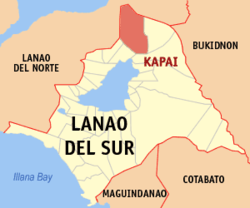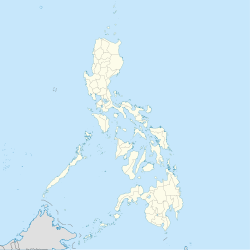Kapai, officially the Municipality of Kapai (Maranao: Inged a Kapai; Tagalog: Bayan ng Kapai), is a municipality in the province of Lanao del Sur, Philippines. According to the 2020 census, it has a population of 20,581 people.[3]
Kapai
كافاي | |
|---|---|
| Municipality of Kapai | |
 Map of Lanao del Sur with Kapai highlighted | |
Location within the Philippines | |
| Coordinates: 8°05′N 124°24′E / 8.08°N 124.4°E | |
| Country | Philippines |
| Region | Bangsamoro Autonomous Region in Muslim Mindanao |
| Province | Lanao del Sur |
| District | 1st district |
| Barangays | 20 (see Barangays) |
| Government | |
| • Type | Sangguniang Bayan |
| • Mayor | Aidah C. Gauraki |
| • Vice Mayor | Hamza E. Gauraki |
| • Representative | Ziaur-Rahman A. Adiong |
| • Municipal Council | Members |
| • Electorate | 9,600 voters (2022) |
| Area | |
• Total | 398.50 km2 (153.86 sq mi) |
| Elevation | 713 m (2,339 ft) |
| Highest elevation | 1,132 m (3,714 ft) |
| Lowest elevation | 561 m (1,841 ft) |
| Population (2020 census)[3] | |
• Total | 20,581 |
| • Density | 52/km2 (130/sq mi) |
| • Households | 2,960 |
| Economy | |
| • Income class | 4th municipal income class |
| • Poverty incidence | 17.52 |
| • Revenue | ₱ 145.9 million (2020) |
| • Assets | ₱ 80.77 million (2020) |
| • Expenditure | ₱ 148.2 million (2020, 2019) |
| • Liabilities | ₱ 3.207 million (2020) |
| Service provider | |
| • Electricity | Lanao del Sur Electric Cooperative (LASURECO) |
| Time zone | UTC+8 (PST) |
| ZIP code | 9709 |
| PSGC | |
| IDD : area code | +63 (0)63 |
| Native languages | Maranao Tagalog |
| Website | www |
Geography
editBarangays
editKapai is politically subdivided into 20 barangays. Each barangay consists of puroks while some have sitios.
- Cormatan
- Dimagaling (Dimagalin Proper)
- Dimunda
- Doronan
- Poblacion (Kapai Proper)
- Malna Proper
- Pagalongan
- Parao
- Kasayanan Proper
- Kasayanan West
- Dilabayan
- Dilimbayan
- Kibolos
- Kining
- Pindolonan
- Babayog
- Gadongan
- Lidasan
- Macadar
- Pantaon
Climate
edit| Climate data for Kapai, Lanao de Sur | |||||||||||||
|---|---|---|---|---|---|---|---|---|---|---|---|---|---|
| Month | Jan | Feb | Mar | Apr | May | Jun | Jul | Aug | Sep | Oct | Nov | Dec | Year |
| Mean daily maximum °C (°F) | 25 (77) |
25 (77) |
26 (79) |
27 (81) |
26 (79) |
26 (79) |
26 (79) |
26 (79) |
26 (79) |
26 (79) |
26 (79) |
25 (77) |
26 (79) |
| Mean daily minimum °C (°F) | 21 (70) |
20 (68) |
21 (70) |
21 (70) |
22 (72) |
22 (72) |
21 (70) |
21 (70) |
21 (70) |
21 (70) |
21 (70) |
21 (70) |
21 (70) |
| Average precipitation mm (inches) | 159 (6.3) |
143 (5.6) |
166 (6.5) |
183 (7.2) |
357 (14.1) |
414 (16.3) |
333 (13.1) |
309 (12.2) |
289 (11.4) |
285 (11.2) |
253 (10.0) |
166 (6.5) |
3,057 (120.4) |
| Average rainy days | 18.4 | 17.2 | 20.6 | 23.4 | 29.3 | 29.2 | 29.9 | 29.4 | 27.7 | 28.7 | 25.5 | 19.9 | 299.2 |
| Source: Meteoblue (modeled/calculated data, not measured locally)[5] | |||||||||||||
Demographics
edit| Year | Pop. | ±% p.a. |
|---|---|---|
| 1918 | 596 | — |
| 1939 | 891 | +1.93% |
| 1948 | 1,476 | +5.77% |
| 1960 | 5,029 | +10.75% |
| 1970 | 5,169 | +0.27% |
| 1975 | 9,243 | +12.36% |
| 1980 | 5,544 | −9.71% |
| 1990 | 11,221 | +7.31% |
| 1995 | 13,310 | +3.25% |
| 2000 | 16,564 | +4.80% |
| 2007 | 18,916 | +1.85% |
| 2010 | 17,370 | −3.06% |
| 2015 | 18,894 | +1.61% |
| 2020 | 20,581 | +1.70% |
| Source: Philippine Statistics Authority[6][7][8][9] | ||
Economy
editPoverty Incidence of Kapai
10
20
30
40
50
60
70
80
90
2000
72.75 2003
60.22 2006
41.70 2009
43.02 2012
74.76 2015
73.60 2018
88.91 2021
17.52 Source: Philippine Statistics Authority[10][11][12][13][14][15][16][17] |
References
edit- ^ Municipality of Kapai | (DILG)
- ^ "2015 Census of Population, Report No. 3 – Population, Land Area, and Population Density" (PDF). Philippine Statistics Authority. Quezon City, Philippines. August 2016. ISSN 0117-1453. Archived (PDF) from the original on May 25, 2021. Retrieved July 16, 2021.
- ^ a b Census of Population (2020). "Bangsamoro (BARMM)". Total Population by Province, City, Municipality and Barangay. Philippine Statistics Authority. Retrieved 8 July 2021.
- ^ "PSA Releases the 2021 City and Municipal Level Poverty Estimates". Philippine Statistics Authority. 2 April 2024. Retrieved 28 April 2024.
- ^ "Kapai, Lanao del Sur : Average Temperatures and Rainfall". Meteoblue. Retrieved 27 January 2019.
- ^ Census of Population (2015). "ARMM – Autonomous Region in Muslim Mindanao". Total Population by Province, City, Municipality and Barangay. Philippine Statistics Authority. Retrieved 20 June 2016.
- ^ Census of Population and Housing (2010). "ARMM – Autonomous Region in Muslim Mindanao" (PDF). Total Population by Province, City, Municipality and Barangay. National Statistics Office. Retrieved 29 June 2016.
- ^ Censuses of Population (1903–2007). "ARMM – Autonomous Region in Muslim Mindanao". Table 1. Population Enumerated in Various Censuses by Province/Highly Urbanized City: 1903 to 2007. National Statistics Office.
- ^ "Province of Lanao del Sur". Municipality Population Data. Local Water Utilities Administration Research Division. Retrieved 17 December 2016.
- ^ "Poverty incidence (PI):". Philippine Statistics Authority. Retrieved December 28, 2020.
- ^ "Estimation of Local Poverty in the Philippines" (PDF). Philippine Statistics Authority. 29 November 2005.
- ^ "2003 City and Municipal Level Poverty Estimates" (PDF). Philippine Statistics Authority. 23 March 2009.
- ^ "City and Municipal Level Poverty Estimates; 2006 and 2009" (PDF). Philippine Statistics Authority. 3 August 2012.
- ^ "2012 Municipal and City Level Poverty Estimates" (PDF). Philippine Statistics Authority. 31 May 2016.
- ^ "Municipal and City Level Small Area Poverty Estimates; 2009, 2012 and 2015". Philippine Statistics Authority. 10 July 2019.
- ^ "PSA Releases the 2018 Municipal and City Level Poverty Estimates". Philippine Statistics Authority. 15 December 2021. Retrieved 22 January 2022.
- ^ "PSA Releases the 2021 City and Municipal Level Poverty Estimates". Philippine Statistics Authority. 2 April 2024. Retrieved 28 April 2024.
External links
edit- Kapai Profile at the DTI Cities and Municipalities Competitive Index
- Philippine Standard Geographic Code
- Philippine Census Information



